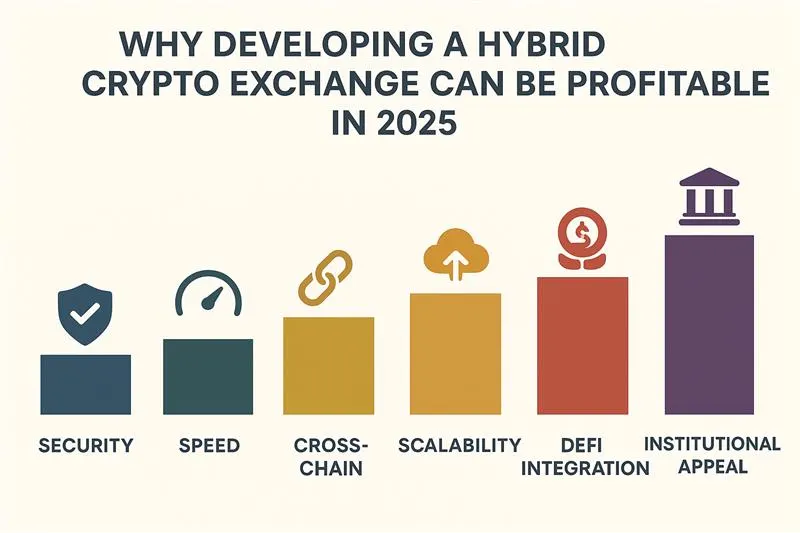If you could get the freedom of a decentralized exchange (DEX) and the speed of a centralized exchange (CEX) in one place, who wouldn’t want it?
That’s exactly what hybrid crypto exchanges offer.
Traders are rushing in because they can enjoy fast trades, complete control, and outstanding security all at once.
Whether you're a beginner trying to navigate the market or an experienced entrepreneur looking for smarter solutions, these platforms can offer you an enormous benefit.
Let’s see why these platforms are quickly becoming the go-to choice for smart traders everywhere.
What is a Hybrid Crypto Exchange?
A hybrid crypto exchange combines the security of CEX and control of DEX, giving traders fast, safe, and flexible trading all in one platform. It offers:
- High liquidity and fast transactions like CEX
- Enhanced security and user control like DEX
- Lower fees and transparency compared to fully centralized platforms
- Smart contract integration for decentralized trading options
By blending these strengths, hybrid exchanges give traders a fast, secure, and user-friendly trading experience, while also supporting regulatory compliance.
Difference Between CEX, DEX, and Hybrid
When it comes to crypto trading, not all exchanges are the same. Traders have three primary options: centralized exchanges (CEX), decentralized exchanges (DEX), and hybrid exchanges. Understanding the differences might help businesses create better platforms and attract more people.
Here’s a clear table that differentiates the type of exchange:
| Factors | CEX | DEX | Hybrid Exchange |
| Control | Managed by a company | Users control their wallets | Mix of company management & user control |
| Liquidity | High liquidity, fast trading | Limited liquidity | High liquidity through hybrid pooling |
| Security | Vulnerable to hacks | Very secure, users hold keys | Enhanced security with a combined model |
| User Experience | Easy to use | It can be complex for beginners | User-friendly yet feature-rich |
| Transaction Speed | Fast | Slower due to blockchain confirmations | Fast with blockchain reliability |
| Fees | Generally higher | Lower, depends on blockchain | Moderate, balancing both models |
From this table, you can see the main differences between them. Now, let’s explore why traders and businesses are highly choosing hybrid exchanges.
Why Traders Prefer Hybrid Crypto Exchanges: A Guide for Entrepreneurs
Hybrid crypto exchanges are becoming more popular because they blend the best of centralized and decentralized platforms and solve many problems traders face with traditional exchanges. Here’s why more traders are choosing this model:
1. Stronger Security
Hybrid exchanges use decentralized platforms to handle funds and conduct on-chain transactions. This reduces the risk of hacking, making users' funds safer and more secure.
2. Better User Experience
This exchange provides quick and easy trading like centralized exchanges while maintaining the privacy and control of decentralized exchanges. Traders receive the speed they need with security and control.
3. Compliance with Regulations
By including features like KYC (Know Your Customer) and AML (Anti-Money Laundering), hybrid crypto exchanges follow regulatory standards. This makes them more reliable for traders and attractive to institutions.
4. Flexible Asset Management
Traders can choose between self-custody and letting the platform handle their funds. This flexibility allows them to choose how they prefer to store and exchange their assets based on their own requirements.
5. Advantages for Entrepreneurs
For entrepreneurs, hybrid exchanges provide chances for crypto exchange development and the launching of blockchain trading platforms. It attracts a wide range of users by combining speed, security, and compliance, providing businesses a way to stay ahead of competitors.
Hybrid crypto exchanges solve the limitations of traditional CEX and DEX models, making them the preferred choice for traders and a smart investment for entrepreneurs.
New plans. New projects. New results. Or just another scroll
session. You choose the story.
Must-Have Features of Hybrid Exchange Development
Building a hybrid exchange involves integrating the strong features of both CEX and DEX to make it successful. Some important features you shouldn’t miss are:
On-Chain and Off-Chain Transactions
Hybrid exchanges allow trade to occur both on the blockchain (on-chain) and off-chain.
- On-chain transactions give transparency and security as they are recorded directly on the blockchain.
- Off-chain transactions provide fast execution, reducing waiting times for active traders.
This dual system delivers users the best of both worlds: safe trade along with speed.
Dual Wallet System
A strong hybrid platform supports both hot and cold wallets:
- Hot wallets (centralized): Quick and simple for daily trade.
- Cold wallets (decentralized): Secure storage where users have control over their private keys.
This configuration allows traders to choose whether speed or safety, based on their requirements.
High Liquidity and Market Stability
Liquidity is a must for successful trading. Hybrid crypto exchanges use liquidity pools and market-making techniques to reduce price slippage. Some even use automated market makers (AMMs) to provide a steady and productive trading environment.
Users benefit from the high liquidity of centralized exchanges without losing decentralized benefits.
Smart Contract Integration
Smart contracts add an extra layer of trust and security. They perform trade automatically when certain conditions are satisfied without depending on middlemen. This means that transactions are fair, transparent, and unbreakable, giving users trust in the system.

Compliance with KYC and AML
Hybrid crypto exchange platforms can integrate Know Your Customer (KYC) and Anti-Money Laundering (AML) standards. This makes them:
- Safer for users
- Attractive for institutions that want regulated trading platforms.
Hybrid exchanges are compliant, which allows for global adoption and long-term growth.
These features not only attract traders but also make the platform sustainable and trustworthy for entrepreneurs who are entering the crypto market.
How Developing a Hybrid Crypto Exchange Can Be Profitable in 2025?
In 2025, the crypto market is evolving, and traders want platforms that are secure, quick, and simple to use. Hybrid exchanges fulfill this by merging the benefits of CEX and DEX into a single strong solution.
Here’s why starting a hybrid crypto exchange in 2025 can be a smart and profitable move:
- More security, more trust: Centralized exchanges have chances to get hacked. Hybrid exchanges allow users to keep ownership of their money while using smart contracts to ensure trades are secure and transparent.
- Fast and Smooth Trading: Unlike DEXs, which can be slow or complicated, hybrid exchanges provide users with fast order matching, high liquidity, and a user-friendly interface.
- Ready for regulations: Governments are passing more restrictions on cryptocurrency. Hybrid crypto exchange platforms can include KYC/AML features, making them safe for both traders and big investors.
- Cross-chain Power: With so many blockchains and tokens available, users want a single platform for trading them all. This exchange resolves the issue by enabling cross-chain trading.
- Built for Scale: As trade volumes increase in 2025, hybrid exchanges can manage the load. They use centralized systems to speed up transactions and blockchain technology to ensure safe payments.
- Extra Earning Options: Hybrid platforms can also integrate with DeFi, including features such as staking, lending, and yield farming. This means that users can trade and receive passive revenue simultaneously.
- Appealing to Institutions: Hedge funds and enterprises require secure, compliant, and liquid platforms. Hybrid exchanges tick all of these boxes, making them an excellent alternative for professional investors.
In short, hybrid crypto exchange development in 2025 is a golden opportunity. So, don’t miss it and grab it before this year ends.
In this section, I want an image like this. This image has missed some of the factors. I want this with all the factors mentioned in this section.
Common Challenges Faced by Hybrid Crypto Exchange Software Solution
Developing and running a hybrid crypto exchange software isn’t free from hurdles. Entrepreneurs should be aware of these common challenges and how to overcome them:
Complex Development Process
Creating a hybrid exchange is not as simple as developing a traditional CEX or DEX platform. Advanced expertise of both technologies, as well as perfect integration, is required to make the system fast, secure, and reliable.
Tips to overcome:
- Partner with a skilled hybrid crypto exchange development company that has experience in both CEX and DEX systems.
- Invest in scalable design and powerful backend infrastructure from the beginning.
- Regular testing and upgrades can help to guarantee that operations run smoothly.
Regulatory Uncertainty
The global crypto market still lacks clear rules, and hybrid exchanges frequently lead into the confusion. Different countries have different rules, which makes compliance challenging for businesses.
Tips to overcome:
- Work with legal advisers who specialize in crypto rules.
- Ensure that your platform follows fundamental KYC (Know Your Customer) and anti-money laundering (AML) regulations.
- Stay updated with the latest government guidelines to avoid penalties or restrictions.
User Awareness and Adoption
Because hybrid exchanges are new, many traders may not completely understand how they function. This might result in hesitancy or slow adoption.
Tips to overcome:
- Launch basic educational initiatives using blogs, tutorials, and webinars.
- Provide a user-friendly interface that makes the platform accessible to people new to it.
- Offer great customer service to new users, guiding them step by step.
Top Hybrid Crypto Exchange Software You Should Know About
Several leading platforms have already adopted this model, showing how hybrid crypto exchange software is shaping the future of digital trading. Here are some top examples:
- Bitget
Bitget provides a perfect combination of centralized liquidity and decentralized wallet solutions. Traders use the efficiency of a CEX while storing their assets in non-custodial wallets, making it both secure and user-friendly.
- Loopring
Loopring has a unique design in which trade matching occurs via centralized order books, but funds are protected by decentralized custody enabled by zkRollups. This allows traders to conduct fast, low-cost transactions while maintaining complete control of their assets.
- Binance DEX
Binance DEX provides users with high liquidity and speed while allowing them to trade directly from their own wallets using smart contracts. It's a perfect combination of security and performance.
- Gemini
Gemini uses a dual approach. On the one hand, it follows strict centralized compliance standards such as KYC/AML for institutional investors. On the other hand, it offers decentralized wallet solutions for users who prefer self-custody, providing flexibility for a variety of trades.
- Coinbase
Coinbase has also entered the hybrid area with wallet services that let users keep assets in a non-custodial manner while still profiting from powerful CEX features such as high liquidity and advanced tools.
Conclusion
In the end, hybrid crypto exchanges aren’t just another option; they’re the smart evolution of trading. By combining the speed and liquidity of centralized platforms with the security and control of decentralized systems, they offer the best of both worlds.
For traders, this means safer, faster, and more flexible trading.
For entrepreneurs, it opens up exciting opportunities to build innovative platforms that meet the rising demand of the crypto market.
At Hashcodex, we help entrepreneurs worldwide turn these opportunities into reality. Our development process is simple, efficient, and always delivered on time. With our expert team’s hands-on experience, we truly care about every project we take on.
If you’re looking for a reliable partner to build your hybrid crypto exchange or other blockchain solutions, we’re ready to shake hands with you.
Contact us today!











